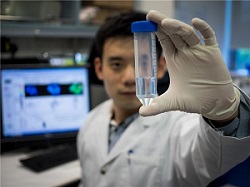 |
| NTU researcher Li Liang holding the new antibody which can help patients suffering from pneumonia and influenza to recover faster.--Courtesy NTU |
Scientists at the Nanyang Technological University in Singapore say they've completed a successful mouse study of a new antibody designed to spur the recovery of patients suffering from pneumonia and influenza. And they're now preparing for human studies.
NTU Singapore's Associate Professor Andrew Tan led an interdisciplinary team of scientists to test the antibody, which blocks the protein ANGPTL4, found in high concentrations in tissue from flu and pneumonia patients.
"When the antibody we developed was given to mice suffering from pneumonia and influenza which had high levels of ANGPTL4, these mice recovered much faster than the other mice which didn't receive the antibodies," Tan said.
"We know that ANGPTL4 usually helps to regulate blood vessel leakiness. But this is the first time we have shown that by blocking this protein, we are able to control the natural response of inflammation, which in turn reduces the damage that inflammation does to the lungs."
Tan says that they should be able to develop an effective diagnostic test that can be used to identify patients most at risk, a tool which could prove particularly effective during a pandemic. That diagnostic should be completed in about three years, he says, while a clinical-stage program would likely take 8 years to finish.
The World Health Organization tracks anywhere from 300,000 to 500,000 deaths a year from influenza, with pneumonia taking a big toll on infants under the age of 5.
- here's the release